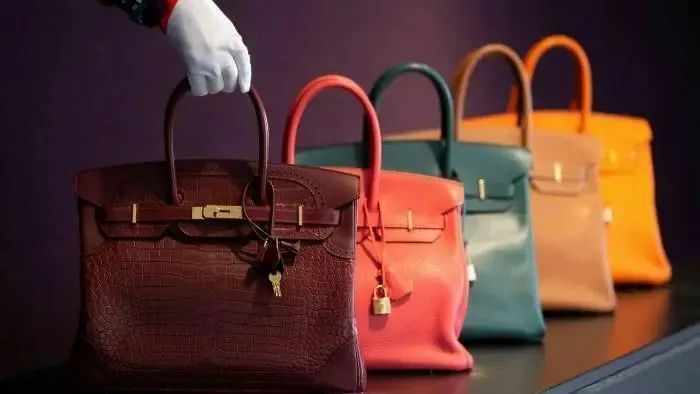
The number of this text is 1712, and the reading time is about 4 minutes
Wen | Cheng Qian is a practicing lawyer in California and former editor of the Stanford Journal of Law, Business and Finance
Editor|Zhu Tao
On February 8, 2023, Eastern Time, the Federal District Court for the Southern District of New York pronounced a judgment that the plaintiff in the case of Hermès International and Hermès Paris (hereinafter referred to as "Hermes") v. Manson Rothschild prevailed. The jury ruled that the Rothschild-issued "MetaBirkins" NFT infringed Hermès' trademark rights and should pay the plaintiff $133,000 in damages.
In May 2021, 28-year-old California artist Manson Rothschild auctioned off his design and minted "Baby Birkin" NFT on the Basic Space website, which sold for 5.5 ETH (the current price is about $23,500). In November of the same year, Rothschild opened MetaBirkins.com website and promoted his newly minted 100 "Yuan Platinum" NFTs to NFT buyers on Twitter. The image of these NFTs is similar to Hermès' classic handbag platinum bag. Hermès noted in the indictment that the company completed the design of the "Birkin" bag in 1984 and launched it on the U.S. market in 1986. Hermès registered the "Platinum" series of trademarks with the United States Patent and Trademark Office and has always been the owner of the trademark.
The initial price of the "Yuan Platinum" NFT is 0.1ETH (the current price is $450) and can be purchased on the mainstream NFT trading platforms OpenSea, Rarible, and LooksRare. In addition to the initial sales revenue, Rothschild can also receive 7.5% of the transaction amount from subsequent resale transactions as resale proceeds, which NFT traders often call "royalties". According to the New York Times, Hermès believes that the "Yuan Platinum" NFT sold about $1.1 million, while Rothschild claims that he earned about $12.50.
When Hermès noticed the "Yuan Platinum" NFT on the market, it issued a notice of cessation of infringement to OpenSea in December 2021. OpenSea quickly removed the "Meta Platinum" NFT from its website, and Rothschild expressed strong dissatisfaction with it. In an open letter to Hermes, OpenSea, and the user community, he argued that "Meta Platinum" NFTs are artistic creations, part of free speech, and should be protected by the First Amendment to the U.S. Constitution.
Rothschild's explanation was not endorsed by Hermes. On January 14, 2022, Hermes formally filed a lawsuit in the U.S. District Court for the Southern District of New York, alleging trademark infringement, trademark dilution, cybersquatting, damage to goodwill, and unfair competition.
The court held that the question of whether "meta-platinum" NFTs as artistic expression constituted trademark infringement should be based on Rogers v. Grimaldi. Grimaldi) – the "Rogers test" – to judge. The Rogers test grew out of a 1988 trademark dispute between American actor Ginger Rogers and filmmaker Alberto Grimaldi. In this case, the U.S. Court of Appeals for the Second Circuit established a two-stage test, namely (1) whether the use of the trademark was artistically related to the defendant's work, and (2) whether the defendant's use of the trademark was clearly misleading.
The court noted that the Rogers test required that the defendant's use of the plaintiff's mark should be for artistic, non-commercial, and not intended to extract goodwill value from the plaintiff's trademark. This criterion can easily be met unless there is no artistic connection between the defendant's use of the trademark and its creation. On this issue, Hermès believes that Rothschild is purely extracting the goodwill value of "platinum", while Rothschild advocates that "meta-platinum" NFT is part of its artistic experiment, aiming to explore the attitude and influence of wealthy and powerful consumers towards virtual products such as "meta-platinum".
The court emphasized that even if the defendant's use of the plaintiff's trademark had some artistic connection with its artistic creation, it should not be protected by the First Amendment to the U.S. Constitution if it was clearly misleading. If the defendant induces the public to mistakenly believe that the work in question was created by the plaintiff or authorized by the plaintiff, then there is "clear misleading". Hermès cited expert research that 18.7% of potential NFT consumers will confuse "platinum" with "yuan platinum", and many community users also mistakenly believe that Hermes is involved in this project. Rothschild's lawyers argue that consumers who can afford to buy expensive platinum bags are not misled by this artistic creation.
After the trial, a jury of nine jurors finally upheld Hermès' claim, finding that Rothschild constituted trademark infringement, trademark dilution and cybersquatting.
This case is of great significance to the metaverse and Web 3.0 industry. In the past year or two, many practitioners of the metaverse and Web 3.0 have had a lot of controversy and misunderstanding about the application of intellectual property law in the metaverse and Web 3.0. Some people believe that the metaverse and Web 3.0 have their own unique intellectual property systems, and related creations are not governed by traditional intellectual property laws, while others advocate that new IP agreements and types should be promoted in the metaverse and Web 3.0, such as CC0 (Creative Commons), which gives up the copyright of works.
The Hermès judgment has provided guidance for NFT-related intellectual property disputes, and also made creators once again pay attention to the value of intellectual property in the metaverse and Web 3.0, and the value of the metaverse and Web 3.0 and the connection between the real world.